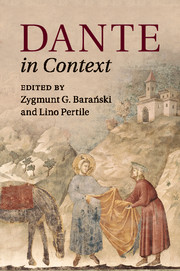Book contents
- Frontmatter
- Dedication
- Contents
- List of illustrations
- List of maps
- Notes on contributors
- Chronology
- Abbreviations and note on translations
- Introduction
- Part I Politics and society
- 1 Empire, Italy, and Florence
- 2 Economy
- 3 Law
- 4 Justice
- 5 Men and women
- 6 Church and orthodoxy
- 7 Heresy and dissidence
- 8 Daily life
- Part II Intellectual traditions
- Part III Linguistic and literary cultures
- Part IV Visual and performative culture
- Part V Dante: life, works, and reception
- Further reading
- Index
2 - Economy
from Part I - Politics and society
Published online by Cambridge University Press: 05 October 2015
- Frontmatter
- Dedication
- Contents
- List of illustrations
- List of maps
- Notes on contributors
- Chronology
- Abbreviations and note on translations
- Introduction
- Part I Politics and society
- 1 Empire, Italy, and Florence
- 2 Economy
- 3 Law
- 4 Justice
- 5 Men and women
- 6 Church and orthodoxy
- 7 Heresy and dissidence
- 8 Daily life
- Part II Intellectual traditions
- Part III Linguistic and literary cultures
- Part IV Visual and performative culture
- Part V Dante: life, works, and reception
- Further reading
- Index
Summary
More than a decade before the birth of Dante in 1265, Florence was already the largest city in Tuscany and the dominant commercial power in the region. According to the Florentine chronicler Giovanni Villani (c.1276–1348), the urban population of Florence was twice the size of Pisa's by about the middle of the thirteenth century. The introduction of the gold florin in 1252 and the sustained issue of the new coin over the succeeding decades, despite its initial unpopularity, attest to a build-up of gold reserves among the city's merchant bankers and the extent to which Florentine trade and finance had developed. Of the other Tuscan cities, only Lucca struck a gold coin during the thirteenth century. After two attempts, however, monetary authorities in Lucca abandoned the project, like most governments elsewhere in Europe that either began to strike gold coinage during the two or three decades after the introduction of the florin or else planned to do so (for instance, the kings of England and France, the Roman Senate, Perugia, and Bologna). Only in Florence, along with Genoa and later Venice, were commerce, finance, and industry sufficiently developed and the gold supply dependable enough in the thirteenth century to support the sustained production of gold coins.
As a Guelf city, Florence benefitted from the virtual interregnum that began with the death of Emperor Henry VI (1165–97; sole king of Italy 1190; emperor 1191), and lasted until his son Frederick II (1194–1250) formally became King of Italy in 1218. In political terms, the breakdown of imperial power afforded Florentine authorities the scope to found the Tuscan League within just a few months of Henry's death and to consolidate their position at the head of the League as the dominant Guelf political power in Tuscany. It also gave Florence freedom to deal harshly with competing interests in its own territory without fear of military reprisal. Furthermore, it very likely produced conditions more favourable to Florentine economic expansion by reducing barriers to trade posed by the traditionally Ghibelline cities and seigniorial powers in Tuscany.
The accelerated pace of Florentine commercial expansion during the early years of the thirteenth century was evident at the international level by the 1220s.
- Type
- Chapter
- Information
- Dante in Context , pp. 30 - 46Publisher: Cambridge University PressPrint publication year: 2015

